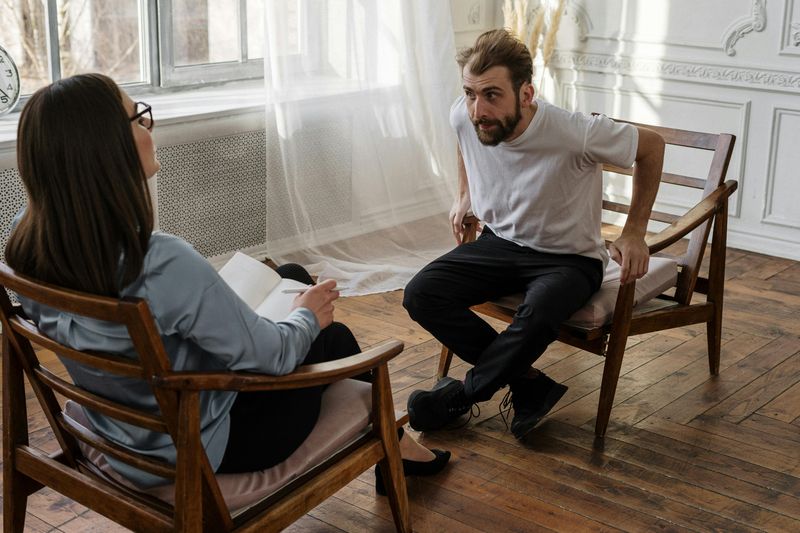12 Ways Childhood Shame Shows Up in Adult Relationships

The shame we feel as children doesn’t just disappear when we grow up. Instead, it often sneaks into our adult relationships in ways we might not even notice. These hidden patterns can make it hard to connect with partners, friends, and even family members. Understanding how past shame affects your present relationships is the first step toward healthier connections.
1. Fear of Being Truly Seen

Adults who experienced shame as children often develop an intense fear of vulnerability. They build walls to protect themselves, believing that if someone sees their true self, rejection will follow.
This protective mechanism shows up as difficulty sharing feelings, deflecting personal questions, or even sabotaging relationships that start getting too close. The underlying belief is that their authentic self isn’t worthy of love.
Many struggle with accepting compliments or positive feedback, dismissing them as mistakes or lies rather than truths about their value.
2. Perfectionism as Protection

Striving for flawlessness becomes a shield against criticism for those who faced childhood shame. The reasoning is simple: if everything is perfect, there’s no room for judgment or rejection.
This manifests as overworking, obsessing over minor details in shared spaces, or becoming distressed when plans change unexpectedly. Behind the perfectionism lies a desperate attempt to be worthy of connection.
Partners often feel exhausted trying to meet impossible standards or walking on eggshells around perceived failures that trigger shame responses.
3. Constant Apologizing

Sorry becomes the default response when childhood shame follows you into adulthood. Excessive apologizing happens for things that aren’t your fault or don’t warrant an apology at all.
Taking up space, having needs, or expressing opinions all trigger the need to apologize. This pattern stems from early messages that your existence itself was somehow wrong or burdensome to others.
Relationships become unbalanced as the chronic apologizer assumes blame for problems, creating frustration for partners who sense the inauthentic nature of these constant apologies.
4. People-Pleasing at Any Cost

The need to make others happy becomes overwhelming when childhood shame is at play. People-pleasers sacrifice their own needs, opinions, and even physical comfort to avoid disapproval.
This behavior shows up as difficulty saying no, agreeing with others despite having different opinions, or exhausting yourself meeting others’ needs while neglecting your own. The core belief driving this pattern is that your value comes from what you do for others, not who you are.
Relationships suffer from lack of authenticity, with partners never truly knowing the real person behind the pleasing facade.
5. Difficulty Accepting Love

When someone shows genuine affection, those carrying childhood shame often feel suspicious or unworthy. Their internal shame voice whispers they don’t deserve kindness or that strings must be attached.
This manifests as questioning a partner’s motives, feeling uncomfortable with gifts or compliments, or even testing relationships through subtle sabotage. The pattern creates a painful paradox: desperately wanting love while simultaneously pushing it away.
Partners feel confused by the mixed signals and may eventually stop expressing affection when their efforts are consistently met with resistance or disbelief.
6. Emotional Shutdown During Conflict

Conflict triggers intense shame responses in those who learned early that their emotions were unacceptable. When disagreements arise, they mentally check out, physically leave, or refuse to engage.
This pattern appears as stonewalling, suddenly becoming sleepy during serious conversations, or changing the subject when things get emotionally charged. The shutdown happens because conflict feels catastrophic rather than normal.
Partners experience frustration when important issues remain unresolved due to this protective mechanism, creating cycles of approach and withdrawal that damage trust.
7. Harsh Self-Criticism Voiced Aloud

The internal shame critic often becomes external in adult relationships. Negative self-talk gets verbalized, putting partners in the awkward position of constantly reassuring or contradicting these harsh assessments.
Comments like “I’m so stupid” or “No wonder nobody likes me” reflect deeply ingrained shame messages from childhood. This verbal self-flagellation serves as both a protective measure and a way to beat others to the punch in criticism.
Relationships become strained as partners grow weary of providing reassurance that never seems to stick or feel manipulated by the constant need for validation.
8. Jealousy and Insecurity

Growing up feeling not good enough makes adult love feel uncertain. Jealousy isn’t always about others—it’s often rooted in old wounds that fear being left behind.
This manifests as checking phones, questioning friendships, or becoming anxious when your partner enjoys time without you. The jealousy isn’t really about the partner’s behavior but about the deep-seated feeling of unworthiness.
Relationships become strained under constant suspicion, with partners feeling untrusted despite their loyalty, creating a self-fulfilling prophecy of relationship problems.
9. Achievement as Self-Worth

Success becomes the only acceptable currency for those who experienced childhood shame. Relationships take a backseat to career accomplishments or external validation.
This pattern appears as difficulty relaxing, defining yourself by your job title, or feeling worthless during career setbacks. The underlying belief is that love must be earned through impressive achievements rather than freely given.
Partners often feel neglected or valued only for how they enhance the achiever’s status, creating an emotional distance that prevents true intimacy.
10. Control Issues

Shame-based childhoods often create adults who desperately need control in relationships. The unpredictability of their early environments makes uncertainty feel dangerous rather than normal.
This shows up as micromanaging shared spaces, creating rigid relationship rules, or becoming anxious when plans change. The control isn’t about power but about creating safety through predictability.
Partners feel suffocated by these control mechanisms, which limit spontaneity and natural relationship development, creating resentment that the controlling person doesn’t understand.
11. Difficulty Setting Boundaries

Adults who grew up with shame often struggle to set healthy boundaries. Their early experiences taught them that their needs were less important than others’ comfort.
This boundary confusion appears as allowing disrespectful treatment, feeling guilty when saying no, or becoming resentful while still saying yes. The core belief is that having boundaries means being selfish or risking abandonment.
Relationships become unbalanced as these individuals give more than they receive, creating unsustainable dynamics that eventually lead to burnout or silent resentment.
12. Fear of Abandonment

Childhood shame often creates a deep-seated fear that others will eventually leave. This anxiety creates clingy behavior or preemptive relationship sabotage.
The pattern shows up as needing constant reassurance, becoming overly distressed at brief separations, or ironically, leaving relationships first to avoid being left. At its core is the belief that abandonment is inevitable because you’re fundamentally unlovable.
Partners feel suffocated by the intense need for presence and reassurance, creating the very distance the abandonment-fearful person was trying to prevent.

Comments
Loading…